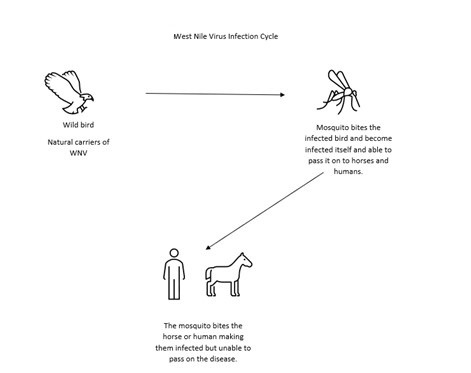Transmission
Birds are known as ‘natural carriers’ of the virus and are infected while in a warmer country and then migrate to other countries. A mosquito then bites an infected bird and becomes a carrier of the virus and can pass it on to other mammals when biting them. Once a horse or human has been infected, they cannot pass the virus directly to another – this makes them known as “end stage hosts”2.

Signs
Most infected horses will not show any signs3 – making it more important to be vigilant of transporting and isolation periods. The incubation period for the virus in horses is approximately 3-15 days after being bitten1. WNV causes encephalomyelitis which is a swelling of the brain and spinal cord.
Horses that do display signs may show:
- Dullness/depression
- Tiredness
- Paralysis of the face (droopy eyelids or lips)
- Head pressing
- Listlessness
- Unable to get up from lying down
- Lack of coordination
- Muscle tremors
- Sensitivity to touch or sound
- Seizures
Diagnosis
Blood would need to be taken from the horse to test for the presence of the virus or an increase in antibodies which would be present if trying to fight off the disease. In some cases, cerebrospinal fluid (colorless liquid taken from around the brain or spine) may also be taken to define the exact cause of possible signs3.
Treatment
There are no specific treatments for WNV. The signs presented may be managed by supportive care but this would have to be assessed on a case-by-case basis, depending on the severity of the signs. Anti-inflammatories and IV fluids may be offered to support the horse through recovery.
Many horses recover and return to full health, although there are a small minority of cases which report long-term effects such as gait abnormalities4. It’s reported that the mortality rate for horses which show clinical signs is between 35%-45%5.
Prevention
Vaccination against the virus is available and is highly recommended for horses being transported abroad to areas where the virus is present4. Humans, as well as horses, are encouraged to seek shelter from mosquitos where possible at peak times of the day this could be providing mosquito nets in stables and humans wearing long sleeved tops and trousers2. Avoiding travel to parts of the world which are at a higher risk of transmission, is also advisable3.


